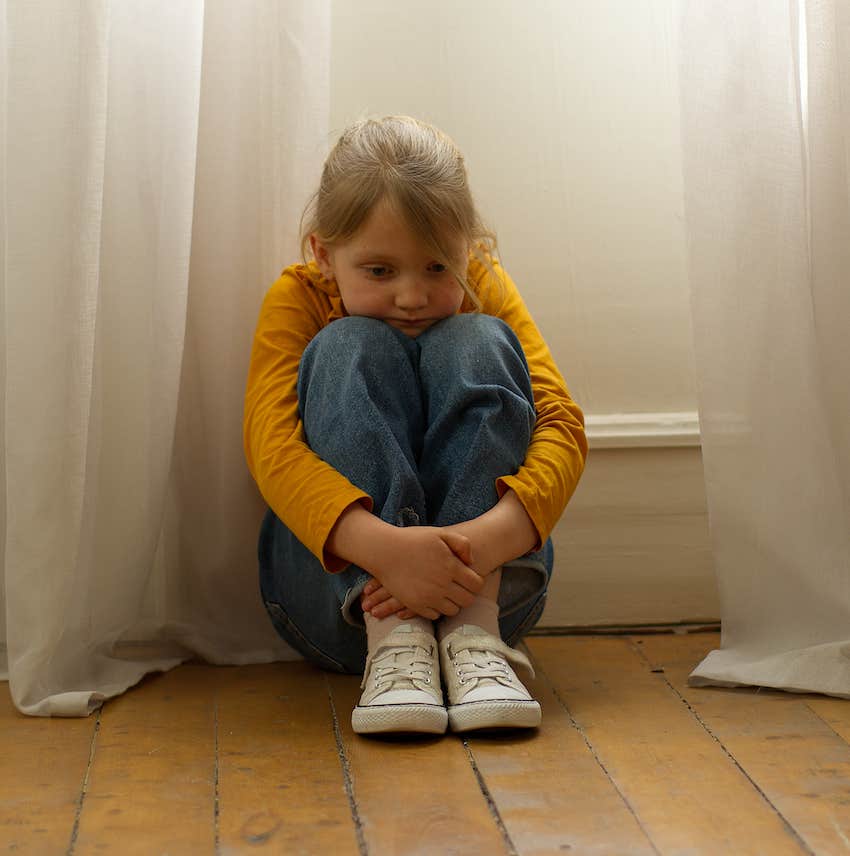Kids Who Thrive Even When Mom Or Dad Is Depressed Have Parents Who Do These 5 Things
A psychologist shares her story and the research into what kids need in turbulent times.
 Lido via Shutterstock
Lido via Shutterstock This is a touchy topic. Depression is a condition where you probably already feel pretty awful. Yes, I have experienced this as a parent myself. Fortunately, kids can thrive even when mom or dad is depressed.
I had two preschool-aged children, was in my fourth year of university, and had a very unhappy marriage. I cried and yelled a lot. Although I was studying psychology, it was only after I came through it that I realized how depressed I felt and the effect on my kids.
I want to tread carefully here, this is not about shaming or guilting. As parents, we feel enough of that already. This is about awareness, with a few simple tips to help both you and your children — as a parent who has been there and a psychologist.
Here's how to keep kids from suffering due to a parent's depression
1. Recognize children are very needy
They will do whatever it takes to get your attention. So if you withdraw, they will amp up their bad behavior to get you to take notice. The old phrase "they just want attention", is true. For a child, any attention is better than no attention.
"Depression is a serious mental health challenge. Parents with depression do things differently from non-depressed parents. The depressed parent may sleep too long, miss feeding and changing times, and provide lackluster infant stimulation. Parents with depression should not feel embarrassed, but they should be realistic," advised psychotherapist Darleen Claire Wodzenski
2. Remember disruptive behavior will not just happen at home but also school
If a child is unhappy at home they are more likely to act up at school, including bullying other kids. This doesn't make a child "bad", it means a child needs something to change (for the better) and more support.
Please remember that not all children who are struggling will have an issue at school. Some play "perfect" at school only to let it all go at home or with an adult they feel safe with.
3. Accept children are intuitive
 Maya Lab via Shutterstock
Maya Lab via Shutterstock
Dr. Wodzenski explained how even very young children perceive parental depression, "Depressed parents may take slower steps, take shallow breaths, have slumped shoulders, and tend to sigh often. People who have depression do not smile as often, are less motivated, and tend to sleep more. And children notice every single detail."
Unconsciously they know something is wrong, so they will try and fix you. As they get older they may offer more hugs, clean the house, or simply stay away from you because that’s what you tell them you need. But, it is not their job to fix their parents.
4. Give children love
"While fully acknowledging that the mental illness is a part of the family, keep in mind that the household emotional dynamic doesn't have to be dictated by the mental illness. You can support your kids by keeping the emotional atmosphere positive and stable. Give them the freedom to have fun," recommended therapist Leslie Capehart.
If they don’t, they will find it elsewhere, friends, other family members, the internet, and sometimes in unsafe circumstances.
5. Know how yelling can have a huge impact on your child
Even if your child is in bed, they can still hear you. And it frightens them because they just want you all to be a happy family, they just want you to love them and to feel loved and they do not understand what is happening.
But all is not lost. It is the little things that you do that will make a big difference.
- Try just lying with your child at bedtime, or even during the day. Stroke their hair and rub their back. Physical contact is very reassuring to you both and helps your child feel safe and secure
- If you lose it, later when you calm down apologize. Own your feelings, get down to your child’s level (literally sit or bend down so you are in direct eye contact), and tell your child that you are sorry. This shows your child that you are human, make mistakes, and that it is ok to say sorry.
- Pop a little note in your child’s school bag or lunch, or leave a note on their bed so when they come home they see it. It doesn’t have to say much, just "I love you" with a smile will brighten their day. Even if you are not feeling the emotion you know the words your child needs to hear.
- Ask for help. It might just be an afternoon play with friends so you get some sleep, your GP, or a therapist. According to NIMH, depression affects 1 in 4 people, so you are not alone.
- Exercise and good nutrition are the number one best way to help with depression. Exercise might include forcing yourself to go outside and kick a ball or push your child on the swing, but the more you exert your lungs the better!
- You may also consider taking your child to a therapist so they can learn what is happening to you, or doing a group that is specifically aimed at kids who have a parent with a mental health issue, as suggested by studies in Medical Care Journal.
Reading about other parent's experiences with depression and anxiety can help normalize how you are feeling. You are not alone, and in the long run, seeking help is far better than going it alone.
Leanne Allen is a psychologist and Life Coach at Reconnect Wellness Centre.

